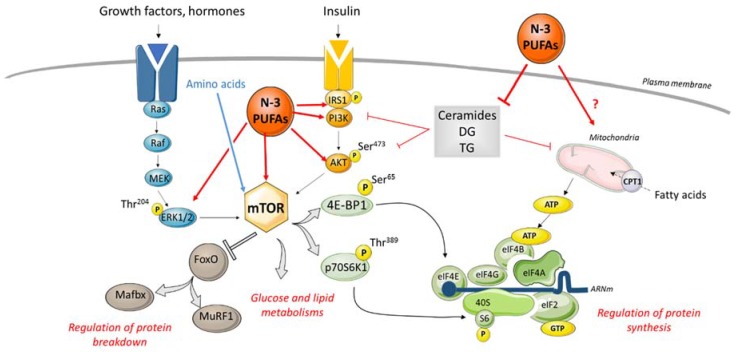Figure 2.
Modulation of muscle protein synthesis and degradation signaling by omega 3 fatty acids (FA). Several factors, such as insulin, amino acids, hormones, cytokines and growth factors can induce the activation by phosphorylation of PI3K/Akt and MAPK pathways. This leads to the activation of mTOR, which regulates glucose and lipid metabolism, activates protein synthesis and inhibits protein breakdown. Mitochondrial function is also a regulator of muscle protein synthesis by providing ATP. Muscle lipotoxicity is characterized by the accumulation of ceramides and diacylglycerols (DG) in muscles, inducing the dysregulation of protein synthesis through the inhibition of the PI3K/Akt pathway and mitochondria activity. If chronically induced, these events can lead to a decrease in skeletal muscle mass. Supplementation with omega 3 FA reduces lipotoxicity-induced muscle metabolism disorders. This effect is mediated by the increased mTOR activation by PI3K/Akt and MAPK pathways and the reduction of ceramides and DG content in muscle. Thus, supplementation with omega 3 FA could improve muscle protein turnover and counteract the loss of skeletal muscle related to lipotoxicity. No data are currently available about the effect of omega 3 FA on mitochondria metabolism during RA. CPT1: Carnitine-palmitoyl transferase 1; DG: Diacylglycerols; eIF: eukaryotic translation Initiation Factor; ERK1/2: Extracellular signal-Regulated Kinases 1/2; FoxO: Forkhead box O; IGFR: Insulin dependent Growth Factor-1 receptor; IR: Insulin receptor; IRS1: Insulin receptor substrate 1; Mafbx: Muscle atrophy F box protein; MurF1: Muscle RING Finger 1; n-3 PUFA: n-3 PolyUnsaturated Fatty Acids; PI3K: PhosphatidylInositol3-Kinase; p70S6K: p70 S6 kinase; Ser: serine residue; S6: S6 ribosomal protein; Thr: Threonine residue; 4E-BP1: 4E-Binding Protein 1.

